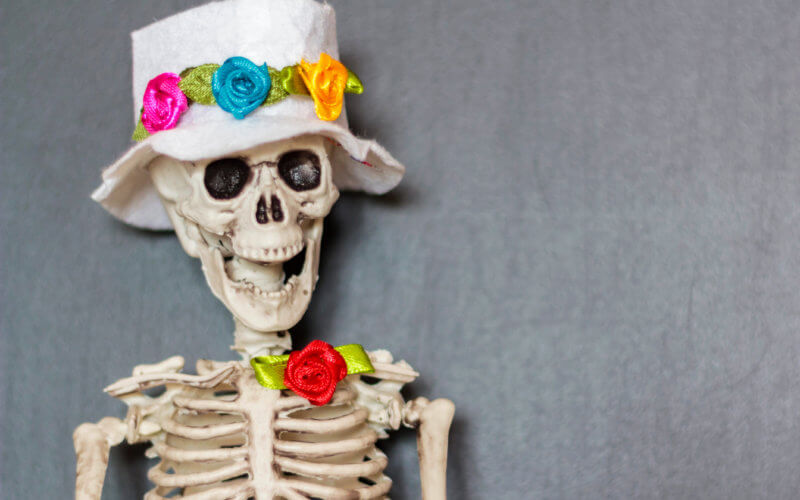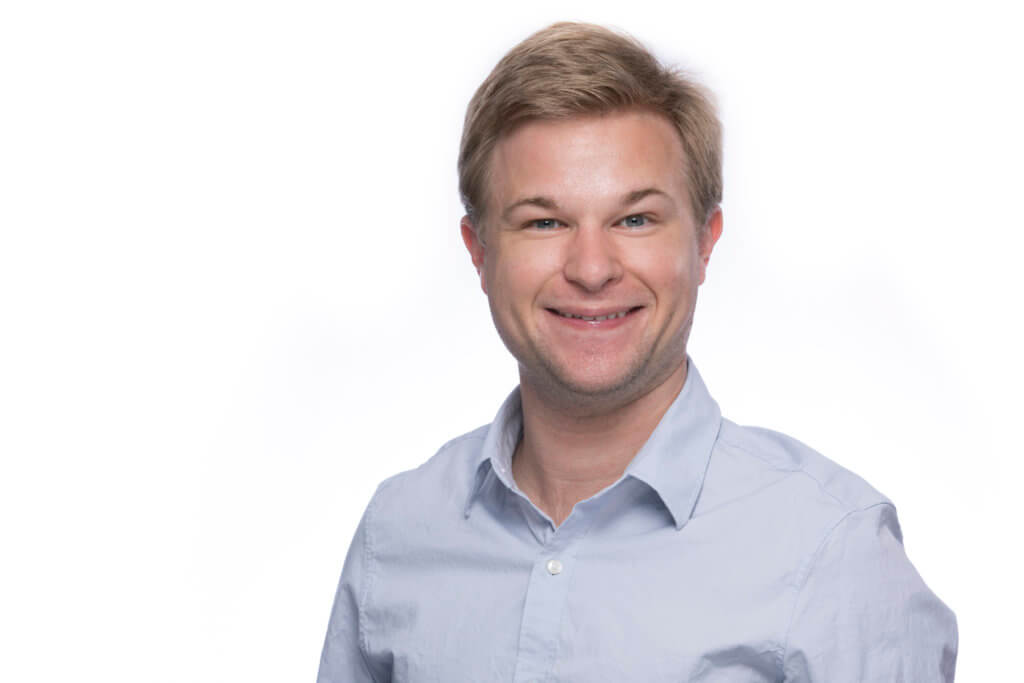
Sitting neatly on Christian Seiter’s desk is a pair of salt and pepper shakers shaped like gravestones, each one with its own inscription: “Here lies salt” and “Here lies pepper.”
Surrounded by death-inspired trinkets and memorabilia, the assistant professor of human communications at Cal State Fullerton calls himself a “death positive scholar” interested in studying end-of-life communication. His research analyzes how different emotions — such as worry and humor — impact people’s willingness to confront their mortality.
By understanding the power of these communication strategies, Seiter’s goal is to encourage people to talk about death and help them work toward what he calls “the good death.”
“Death comes for us all, as harrowing as that can be. Pretending that it’s not going to happen isn’t going to help anybody. In fact, failing to prepare could make the worst day of your loved one’s life unnecessarily worse,” said Seiter. “When time is running short, the gifts that we give are almost all communication-based — things like communicating clearly about what wishes you would want.”
Using Humor to Face Mortality
According to Seiter, planning for a person’s death includes three main steps: reflecting on one’s values and beliefs about the end-of-life, sharing those wishes with loved ones through conversation and formalizing those wishes with documentation, such as advance directives.
Advance care directives include living wills which outline a person’s decisions for medical treatment if they are no longer able to express informed consent, and designating a health care proxy to make medical decisions if a person is unable.
For many, especially young and healthy people, these steps can seem unnecessary or premature, but Seiter said that preparing for the end of someone’s life is similar to packing a spare tire before a long road trip. It’s better to have it and not need it than need it and not have it.
“It’s pretty easy to convince someone who is elderly or someone who’s very ill that this is relevant, but it’s a lot harder to convince college students that they’re not immortal,” he said.
Since the onset of the COVID-19 pandemic, Seiter said that death anxiety has significantly increased. He explained that the constant reminder of death has deterred people from seeking information about end-of-life care.
In a study he conducted in 2020, Seiter found that worry can be used as a mechanism to influence people to take an active role in planning for the end of their life, but in response to the pandemic and high levels of demotivation, he’s interested in another approach to discussing death — humor.
“Humor has the ability to make conversations about death more accessible for everybody,” said Seiter.

This semester, he is working on a research project that evaluates how different levels of humor in a podcast impact listeners’ ability to talk about death and seek out end-of-life precautions. In three podcasts, the speakers talk about advance care planning, but aside from a control episode, one episode adds humor and the third includes humor with profanity.
He is still analyzing the data, but historically, profanity in the death positive movement has been a popular method of encouraging young people to engage with such topics as last wishes and advance care.
Despite Seiter’s best intentions, he knows that there are a lot of reasons why people postpone thinking about their death. For some people, it’s fear that talking about it will invite death into their lives.
No matter the reason, Seiter said it’s important to think about the bigger picture and the additional heartbreak that loved ones could be spared if these conversations occur before it’s too late.
“I’m always amazed by the stories that I hear of people talking about how some of the best days of their lives were some of the last days of their lives because they don’t have to worry about the next steps. Everything is already in place, and they can focus on saying goodbye and leaving with peace,” said Seiter. “Clarity is maybe the greatest gift you could give your loved ones.”
Not everyone is as fascinated with death as Seiter, but there are ways that they can begin to have these conversations in informal and low-risk settings. He said that the first step is to start thinking about one’s mortality and deciding who they would trust to act on their behalf. After discussing those answers with loved ones, people can fill out an advance care directive online without the help of a lawyer.
“I think it’s important for us to step into places of constructive discomfort,” he said. “I’m a big proponent of approaching it with healthy curiosity. If you are curious about it, don’t stifle that. Don’t let societal taboos or myths stop you, and don’t judge yourself for being curious.”
Becoming Death Positive
Seiter found his niche in end-of-life communication as an actor studying medical humanities and bioethics at the University of Rochester School of Medicine and Dentistry. His original goal was to design a theater-based workshop that taught participants clinical empathy. During his program, his adviser sent him to the palliative care unit, and the experience altered his perception of death permanently.
“When I stepped into the very first patient room, I almost fainted and I had to excuse myself. It’s not something that came easily,” said Seiter. “After I composed myself and received a pep talk from my mentor, I reframed the experience and was able to have some of the most meaningful weeks of my life. That’s where I fell in love with the idea of ‘the good death.’”
From that moment on, he shifted his interest away from theater and began his career in academia, conducting research and engaging students with this topic of death.
He brings his expertise into the classroom at CSUF, teaching classes on health communication, processes of social influence and persuasion as well as interpersonal communication and research methods.
“Many people don’t want to admit that we are all a little curious about this, and yet, you would never know because nobody wants to talk about it,” said Seiter. “Especially with COVID-19, we’ve all been living with death very intimately for several years and giving people an avenue to talk about it is a really valuable thing.”